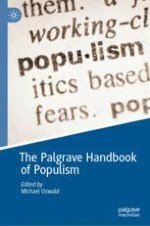2022 | OriginalPaper | Chapter
27. The Framing of Right-Wing Populism: Intricacies of ‘Populist’ Narratives, Emotions, and Resonance
Authors : Julia Leser, Rebecca Pates
Published in: The Palgrave Handbook of Populism
Publisher: Springer International Publishing
Activate our intelligent search to find suitable subject content or patents.
Select sections of text to find matching patents with Artificial Intelligence. powered by
Select sections of text to find additional relevant content using AI-assisted search. powered by
